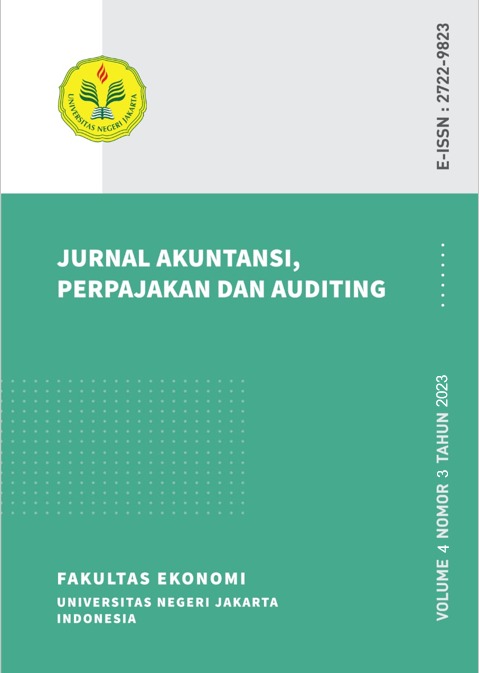Pengaruh Profitabilitas dan Leverage Terhadap Tax Avoidance dengan Ukuran Perusahaan sebagai Moderasi pada Sektor Energi yang Terdaftar di Bursa Efek Indonesia Tahun 2018-2022
DOI:
https://doi.org/10.21009/japa.0403.12Keywords:
Tax Avoidance, Profitability, Leverage, Company SizeAbstract
Every company is expected to pay out taxes in accordance with the laws that have been rooted by the government regarding earnings. On the other hand, there are a number of organizational structures that do not adhere to the need that they pay taxes as a matter of law. The objective of this study is to investigate the connection between profitability and debt in the context of companies avoiding tax payments. A wide variety of energy-related companies are included in this study, which listed on the Indonesia Stock Exchange between the years 2018 and 2022. During the course of the sample collection, which was carried out using the approach of purposive sampling, a total of 170 data were observed. Utilizing SPSS Version 26, which was built for the purpose of this study, the application of the interaction model of moderated regression analysis was carried out on the data that was gathered for this investigation. Therefore, these models are easier to comprehend due to the fact that this is the case. It has been shown via statistical analysis that there is no connection between tax avoidance and earnings. It is possible that the size of the company will have an impact on the use of leverage to avoid paying taxes. Nevertheless, the size of the company does not have any bearing on the use of profitability for the purpose of tax avoidance. The results of this research prove that previous research is still inconsistent and grand theory can still be used as a basis for developing hypotheses.
References
Andini, R., Andika, A. D., & Pranaditya, A. (2022). Analisa Pengaruh Kepemilikan Institusional, Proporsi Dewan Komisaris Independen, dan Profitabilitas Terhadap Penghindaran Pajak dengan Ukuran Perusahaan sebagai Variabel Moderating (Studi Empiris pada Industri Barang Konsumsi yang Terdaftar di Bursa Efek. Jurnal Akuntansi dan Pajak, 22(2), 511. https://doi.org/10.29040/jap.v22i2.3193
Az’zahra, A. S., & Halimatusadiah, E. (2023). Pengaruh Tingkat Profitabilitas Terhadap Penghindaran Pajak (Tax Avoidance) dengan Ukuran Perusahaan sebagai Variabel Moderating. Bandung Conference Series: Accountancy, 3(1), 582–588. https://doi.org/10.29313/bcsa.v3i1.6768
Chitimira, H., & Animashaun, O. (2021). Combating Legal Uncertainty in the Nigerian Tax Avoidance Laws. Acta Universitatis Danubius Œconomica, 17(2), 67–83.
Darsani, P. A., & Sukartha, I. M. (2021). The Effect of Institutional Ownership, Profitability, Leverage and Capital Intensity Ratio on Tax Avoidance. American Journal of Humanities and Social Sciences Research (AJHSSR), 5(1), 13–22.
Dewi, N. L. P. P., & Noviari, N. (2017). Pengaruh Ukuran Perusahaan, Leverage, Profitabilitas dan Corporate Social Responsibility Terhadap Penghindaran Pajak (Tax Avoidance). E-Jurnal Akuntansi Universitas Udayana, 21(1), 830–859. https://doi.org/10.24843/EJA.2017.v21.i02.p01
Fitri, R. A., & Munandar, A. (2018). The Effect of Corporate Social Responsibility, Profitability, and Leverage toward Tax Aggressiveness with Size of Company as Moderating Variable. Binus Business Review, 9(1), 63. https://doi.org/10.21512/bbr.v9i1.3672
Handayani, M. F., & Mildawati, T. (2018). Pengaruh Profitabilitas, Leverage, dan Ukuran Perusahaan Terhadap Penghindaran Pajak. Jurnal Ilmu dan Riset Akuntansi, 7(2), 1–16.
Hermawan, S., Sudradjat, & Amyar, F. (2021). Pengaruh Profitabilitas, Leverage, Ukuran Perusahaan Terhadap Tax Avoidance Perusahaan Property dan Real Estate. Jurnal Ilmiah Akuntansi Kesatuan, 9(2), 359–372. https://doi.org/10.37641/jiakes.v9i2.873
Lestari, J., & Solikhah, B. (2019). The Effect of CSR, Tunneling Incentive, Fiscal Loss Compensation, Debt Policy, Profitability, Firm Size to Tax Avoidance. Accounting Analysis Journal, 8(1), 31–37. https://doi.org/10.15294/aaj.v8i1.23103
Marsahala, Y. T., Arieftiara, D., & Lastiningsih, N. (2020). Profitability, Capital Intensity and Tax Avoidance in Indonesia: The Effect Board of Commissioners’ Competencies. Journal of Contemporary Accounting, 2(3), 129–140. https://doi.org/10.20885/jca.vol2.iss3.art2
Nathania, C., Wijaya, S., Hutagalung, G., & Simorangkir, E. N. (2021). The Influence of Company Size and Leverage on Tax Avoidance with Profitability as Intervening Variable at Mining Company Listed in Indonesia Stock Exchange Period 2016-2018. International Journal of Business, Economics and Law, 24(2), 132–140.
Rifai, A., & Atiningsih, S. (2019). Pengaruh Leverage, Profitabilitas, Capital Intensity, Manajemen Laba Terhadap Penghindaran Pajak. ECONBANK: Journal of Economics and Banking, 1(2), 135–142. https://doi.org/10.35829/econbank.v1i2.48
Rizki, A. A. S., & Amanah, L. (2020). Pengaruh Kebijakan Hutang dan Profitabilitas Terhadap Kebijakan Dividen. Jurnal Ilmu dan Riset Akuntansi, 9(2).
Santoso, Y. I. (2020). Akibat Penghindaran Pajak, Indonesia diperkirakan Rugi Rp 68,7 Triliun. Kontan.
Sari, D., Wardani, R. K., & Lestari, D. F. (2021). The Effect of Leverage, Profitability and Company Size on Tax Avoidance. Turkish Journal of Computer and Mathematics Education, 12(4), 860–868.
Sari, R. A. I., & Priyadi, M. P. (2016). Pengaruh Leverage , Profitabilitas , Size , dan Growth Opportunity Terhadap Nilai Perusahaan. Jurnal Ilmu dan Riset Manajemen, 5(10), 1–17.
Sugeng,Prasetyo, E., & Zaman, B. (2020). Does Capital Intensity, Inventory Intensity, Firm Size, Firm Risk, and Political Connections Affect Tax Aggressiveness? JEMA: Jurnal Ilmiah Bidang Akuntansi dan Manajemen, 17(1), 78–87. https://doi.org/10.31106/jema.v17i1.3609
Sugianto, D. (2019). Mengenal Soal Penghindaran Pajak yang Dituduhkan ke Adaro. Detik.
Sulistiono, E. (2018). Pengaruh Profitabilitas, Leverage, dan Kualitas Audit Terhadap Tax Avoidance. Jurnal Informasi Perpajakan, Akuntansi, dan Keuangan Publik, 13(1), 81–110.
Suyanto, & Kurniawati, T. (2022). Profitabilitas, Pertumbuhan Penjualan, Leverage, Penghindaran Pajak: Ukuran Perusahaan sebagai Variabel Moderasi. Jurnal Manajemen Terapan dan Keuangan, 11(04), 820–832. https://doi.org/10.22437/jmk.v11i04.16725
Wahyuni, L., Fahada, R., & Atmaja, B. (2017). The Effect of Business Strategy, Leverage, Profitability and Sales Growth on Tax Avoidance. Indonesian Management and Accounting Research, 16(02), 67–80.
Widyastuti, I., Wulandari, R., Ambarita, D., & Gustiasari, D. R. (2023). The Effect of Leverage and Capital Intensity on Tax Avoidance with Firm Size as Moderate Variables. Proceedings International Seminar on Accounting Society, 3(1), 8–18.
Widyastuti, S. M., Meutia, I., & Candrakanta, A. B. (2022). The Impact of Leverage, Profitability, Capital Intensity and Corporate Governance on Tax Avoidance. Integrated Journal of Business and Economics, 6(1), 13–27. https://doi.org/10.33019/ijbe.v5i3.334
Yahaya, K. A., & Yusuf, K. (2020). Impact of Company Characteristics on Aggressive Tax Avoidance in Nigerian Listed Insurance Companies. Jurnal Administrasi Bisnis, 9(2), 101–111. https://doi.org/10.14710/jab.v9i2.30512
Yandra, F. A., Agusti, A., & Wijaya, R. A. (2023). Tindakan Penghindaran Pajak melalui Thin Capitalization, Profitabilitas dan Komponen Rugi Fiskal dengan Ukuran Perusahaan sebagai Variabel Moderasi. Innovative: Journal of Social Science Research, 3(2), 8797–8809.






